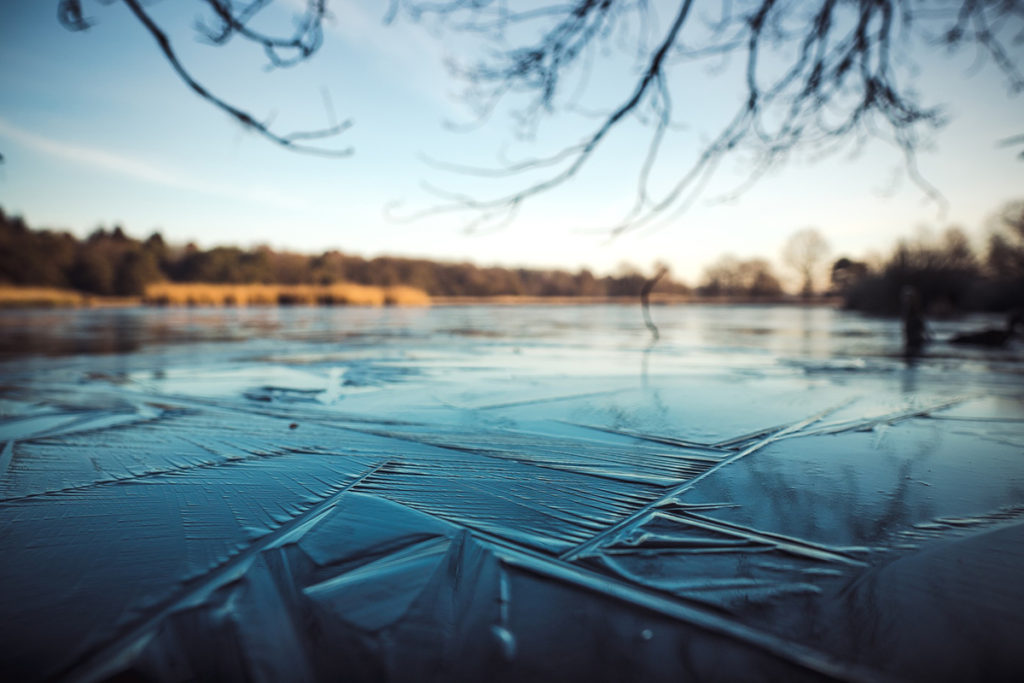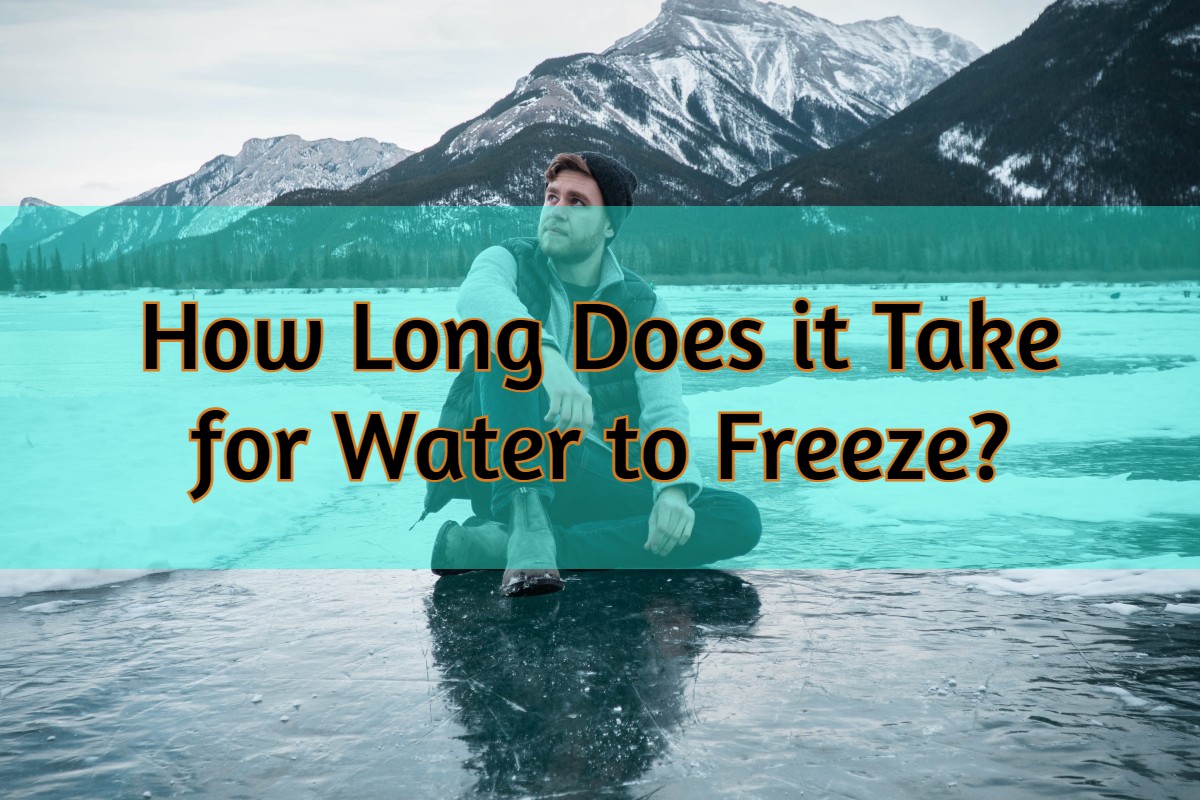We all know that the freezing point of water is 0 Celsius / 32 Fahrenheit, right? But how long does it take for water to freeze? And why is it that sometimes, on a cold winter’s day, you might walk out of your home and find that nearby rivers and ponds are not frozen, while there’s frost and frozen puddles on the ground? Also, if we put a bottle of water in the freezer, how long will it take to turn into ice?
The fact of the matter is that it varies, and calculating all the variables can be very complex. We’ll give you some examples in a moment, but first, we should look at those factors.
Factors that affect how long it does take for water to freeze.
When it comes to freezing water, several factors work in concert to determine how long it takes for water to freeze.
Volume
The volume of water being frozen, whether artificially in a freezer or outside on a cold day, will affect how long it takes for the water to freeze, with larger bodies of water taking longer to freeze solid. This seems relatively intuitive until you realize that water begins to freeze on its exposed surfaces first. So why does a puddle freeze over while a nearby river or stream is still free-flowing?
Movement
The answer lies partly in the movement of the water. Moving water churns the chilled water back into the central thermal mass of the water body. This helps maintain an average temperature in the water column, preventing any initial freezing. However, this reduces the overall water temperature.
While still water bodies freeze first, the exposed outer layer helps insulate the water beneath, slowing down the rate at which it is cooled. When the water gets too cold and the freezing mechanism is finally triggered on moving water, it is liable to freeze throughout. When still water and moving water are compared side by side, moving water will freeze fully first.

Surface Area
If you take the same volume of water and spread it out over a thinner area, the water with more surface area will freeze quicker. Once the crystallization process begins in sealed containers, it will continue to spread from that point in all directions.
For exposed bodies of water (such as puddles, ponds, lakes, and seas), the freezing process will occur along the surface first. It is because water ice is lighter than chilled water and naturally occurs on the surface. Water is at its densest at 4 Celsius / 49.2 Fahrenheit and then gets more lightweight as it gets cooler or warmer from there.
Also Read: Can You Pour Concrete in the Winter?
Temperature Differential
How long does it take for water to freeze? That will depend on how cool the water was before you started freezing it. To freeze water, you need to remove its heat energy. Therefore the warmer it was, to begin with, the longer it would take.
Added to this, the rate of energy removal will depend on the external temperature. Due to the temperature differential, attempting to freeze a room temperature bottle of water will be quicker if your freezer is at -20 C (-4 F) rather than – 5 C (23 F).
Purity of the water
It may come as no surprise at this point that we tell you that even the purity of water itself can affect its freezing point.
- Pure or distilled water: Water, the actual chemical, is made from two hydrogen atoms and one oxygen atom, commonly referred to as H20. This has a freezing point of 0 Celsius / 32 Fahrenheit. However, water will not turn into ice until it has a nucleation point – a place where it can start. Pure water can be collected by distillation with minerals and other contaminants removed. If handled carefully and kept free of contaminants, pure water can be chilled way past its freezing point. This process is called supercooling. Supercooled water can remain a liquid until -42 Celsius / -43 Fahrenheit, but it will freeze almost instantly once crystallization begins. Here is a cool experiment (excuse the pun) by Veritasium showing this process.
- Mineral water: Mineral water contains a range of bonus minerals from its filtering process through rocks, but it will behave the same way as pure water unless a nucleation point is present. Assuming that it is, mineral water will have a fractionally (barely measurable) lower freezing point than pure or distilled water. In other words, it will have to get fractionally colder than 32˚F (0˚C) for mineral water to freeze.
- Seawater: You probably know that seawater is incredibly salty to taste. This saltiness is the result of the incredible variety of chemicals that are dissolved into the water. This chemical cocktail has a measurable effect on the freezing point of seawater. Seawater will freeze at around -2 Celsius / 28.5 Fahrenheit.
How long does it take for water to freeze?
As you can see, there is a wide range of factors that affect how water freezes. So how long does it take for water to freeze? Assuming you are using a regular freezer with an internal temperature of around -18 Celsius / 0 Fahrenheit and a 500ml bottle of water with a 6cm diameter, you would get the following results:
Regular water (Distilled, Mineral or Tap) should freeze in around 2.5 hours.
Water containing one teaspoon of salt should take around four hours to freeze.
The freezing action will happen in time despite the supercooling we mentioned above, as nucleation will occur spontaneously and randomly once the supercooling occurs.
How long does it take for a lake to freeze?
Again, it is difficult to give an exact number with so many factors at play. However, it could take around four to eight weeks for a lake to freeze. The time it takes will depend on the size of the lake, the depth of the lake, average temperatures below freezing and whether the lake is completely still or flowing with some potential currents. Another variable, which is beyond scope of this article, is atmospheric pressure.
Conclusion
So, there we have it. Different bodies of water will freeze at different rates. The commencement of the freezing process can be delayed due to impurities in the water. The shape and surface area will also have significant effects on the speed at which water freezes. Moving bodies of water can keep themselves ice-free for longer but remove any insulating effect from which still or slow-moving bodies of water benefit.
You Might Also Like to Read: What to Do When Your AC Unit Freezes Up?

